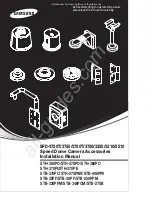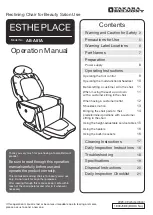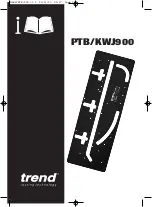
SET THE CLOCK
The Nashbar Tempo Wireless is equipped
with a digital clock that displays time of day in
a 12 or 24 hour format.
STEP 1:
Press the MODE button to advance
to the Clock display screen (CLK). Hold the red
SET button for 4 seconds to enter set-up mode.
STEP 2:
“12” or “24” will flash at the top of the
screen. Press the SET button to select 12 or 24
hour mode. Press the MODE button to confirm
your selection and advance to the hours setting.
STEP 3:
The hours will flash. Press the SET
button (or press and hold) to advance the
hours. If you selected 12 hour mode, “PM” will
appear for hours between noon and midnight.
Press the MODE button to advance to the
minutes setting.
STEP 4:
The minutes will flash. Press the
SET button (or press and hold) to advance
the minutes. Press the MODE button to
advance to the seconds setting.
STEP 5:
The seconds will flash. Press the
SET button to reset the seconds to “00”. Hold
the MODE button to exit set-up mode.
SELECT SPEED SCALE
The Nashbar Tempo Wireless is capable of
displaying speed and distance information in
miles or kilometers.
STEP 1:
Press the MODE button to advance
to the Total Odometer display screen (ODO).
Hold the SET button for 4 seconds to enter
set-up mode.
STEP 2:
“M/H” or “KM/H” will flash in the
display screen. Press the SET button to select
miles (M/H) or kilometers (KM/H).
STEP 3:
Press the MODE button to advance
to the wheel size programming screen.
PROGRAM WHEEL SIZE AND
ODOMETER (ODO1)
STEP 1:
After the speed scale has been
selected (see above), the computer will
automatically advance to the wheel size
programming screen. “ ” or “ ” will flash at
the top of the screen.
STEP 2:
Press the SET button to select
wheel size . Press the MODE button to
advance to the wheel size setting.
STEP 3:
The left-most digit will flash. Press
the SET button to adjust the value according
to the wheel circumference determined above
(see “Determine Wheel Size”). Then press
the MODE button to advance to the next
flashing digit.
STEP 4:
Repeat this sequence until the
correct wheel size has been entered. Then
press the MODE button to advance to the
odometer programming screen for wheel
size (ODO1). (If you don’t wish to program
the odometer, press the MODE button 5 times
to advance to the temperature scale selection
screen, or hold the MODE button to exit set-up.)
STEP 5:
The left-most digit of the odometer
value will flash. Press the SET button to
adjust the value. Then press the MODE
button to advance to the next flashing digit.
STEP 6:
Repeat this sequence until the
odometer value for wheel size has been
set. Then press the MODE button to advance
to the temperature scale selection screen, or
hold the MODE button to exit set-up.
INTRODUCTION
Thank you for purchasing a Nashbar
™
cycle
computer. With all the features that a professional
rider needs to keep track of a ride, the Nashbar
Tempo Wireless is the perfect accessory for any
cyclist. The convenience of coded wireless
transmission makes installation simple and
virtually eliminates interference issues.
BATTERY INSTALLATION
To help you get started quickly, the computer
and transmitter batteries have been installed
at the factory. Under normal use the batteries
should last one to two years. The Nashbar
Tempo Wireless uses a 3V CR2032 button
cell battery (available at most drug stores or
electronic shops) in both the computer and
the transmitter.
NOTE:
Most problems that occur with cycle
computers are caused by weak or dead
batteries. Should you need to replace the
batteries, follow the steps below.
COMPUTER HEAD
NOTE:
During a battery change, all data will
be cleared from memory. Make a note of your
current wheel size settings and cumulative
odometer mileage before replacing the battery
so you can reprogram these values once the
battery is replaced.
STEP 1:
Remove the
battery cover from the
underside of the computer
using a coin (Fig. 1).
Remove the old battery
and dispose of it properly.
STEP 2:
Install a fresh
battery with the positive
(+) side facing the battery cover.
STEP 3:
Install the battery cover securely,
making sure the rubber O-ring seal around
the battery compartment is still in place and
seated properly.
TRANSMITTER
STEP 1:
Remove the
battery cover from the
back of the transmitter
using a coin (Fig. 2).
Remove the old battery
and dispose of it properly.
STEP 2:
Install a fresh battery with the
positive (+) side facing the battery cover.
STEP 3:
Install the battery cover securely,
making sure that the rubber O-ring seal
around the battery compartment is still in
place and seated properly.
COMPUTER FUNCTIONS
CLOCK (CLK)
Displays time of day in a 12 or 24 hour format.
AUTOMATIC RIDE TIMER (TM)
Auto start/stop timer is activated by front
wheel movement and records actual ride time
up to 29:59:59.
CURRENT SPEED (M/H or KM/H)
Displays current speed, up to 62.4 M/H (99.9
KM/H). Accurate to 0.1 M/H or KM/H. Always
displayed at the top of the screen.
AVERAGE SPEED (AVS)
Calculates average speed based on ride time
(TM) & trip distance (DST).
MAXIMUM SPEED (MXS)
Displays highest speed attained during a ride (or
since last reset), up to 62.4 M/H (99.9 KM/H).
SPEED COMPARISON INDICATOR ( or )
Compares current speed to average speed.
As you ride, a ( ) or ( ) will appear next to the
current speed display to indicate whether your
current speed is above ( ) or below ( ) your
average speed. This function is automatic,
requires no programming and cannot be
disabled.
16 x 1.75
20 x 1.75
24 x 1.75
1077
1515
1890
26 x 1.0
26 x 1.95
26 x 1.5
1953
2026
2051
26 x 1.75
26 x 2
1
/
8
26 x 2.0
26 x 1.9
2070
2089
2114
2133
TIRE SIZE
CIRCUMFERENCE
27 x 1
1
/
4
28 x 1.5
2161
2224
700 x 18c
700 x 25c
700 x 23c
2102
2096
2105
700 x 28c
700 x 38c
700 x 35c
700 x 32c
2136
2155
2168
2180
TIRE SIZE
CIRCUMFERENCE
1x
Distance in mm / inch
1mm-2mm
MAGNET
WASHER
NUT
SPOKE
SET
MODE
TRIP DISTANCE (DST)
Displays distance traveled during current
ride (or since last reset), up to 624.99 miles
(999.99 kilometers).
ODOMETER (ODO 1)
Displays cumulative ride distance, up to
62,499 miles (99,999 kilometers) for wheel
size .
ODOMETER (ODO 2)
Displays cumulative ride distance, up to
62,499 miles (99,999 kilometers) for wheel
size .
TOTAL ODOMETER (ODO)
Displays total cumulative ride distance for
both wheel sizes combined, up to 62,499
miles (99,999 kilometers).
DUAL WHEEL SIZE SETTINGS or
Wheel circumference is used to calculate
speed and distance. The Nashbar Tempo
Wireless computer includes two wheel size
settings ( and ), to keep track of ride data
on two bikes with different wheel sizes (e.g.
your road bike and mountain bike).
TEMPERATURE
Displays air temperature in °F or °C, from
32°F to 122°F.
AUTO SLEEP
To prolong battery life, the Nashbar Tempo
Wireless automatically enters “sleep” mode
after 30 minutes of inactivity. In sleep mode,
only the time of day will be displayed. To
activate the computer when it’s in sleep
mode, simply press the MODE button.
DETERMINE WHEEL SIZE
The Nashbar Tempo Wireless uses wheel
circumference (measured in millimeters)
to calculate speed and distance. Before
programming the computer, calculate
wheel circumference using one of the three
methods below.
1. Select size from chart (least accurate):
Use the chart below to find the
circumference for your tire size. The chart
lists the programming sizes for some of
the most popular tire sizes currently in use.
These numbers are estimations which may
not precisely match the circumference of
your wheel, due to variations in tire size
between brands and models.
PROGRAM THE COMPUTER
Before using your Nashbar Tempo Wireless,
you must set the clock, select a speed scale
(miles or kilometers), program wheel size,
set the odometers (if desired), select a
temperature scale (°F or °C) and program
gender and weight.
16 x 1.75
20 x 1.75
24 x 1.75
1077
1515
1890
26 x 1.0
26 x 1.95
26 x 1.5
1953
2026
2051
26 x 1.75
26 x 2
1
/
8
26 x 2.0
26 x 1.9
2070
2089
2114
2133
TIRE SIZE
CIRCUMFERENCE
27 x 1
1
/
4
28 x 1.5
2161
2224
700 x 18c
700 x 25c
700 x 23c
2102
2096
2105
700 x 28c
700 x 38c
700 x 35c
700 x 32c
2136
2155
2168
2180
TIRE SIZE
CIRCUMFERENCE
1x
Distance in mm / inch
1mm-2mm
MAGNET
WASHER
NUT
SPOKE
SET
MODE
16 x 1.75
20 x 1.75
24 x 1.75
1077
1515
1890
26 x 1.0
26 x 1.95
26 x 1.5
1953
2026
2051
26 x 1.75
26 x 2
1
/
8
26 x 2.0
26 x 1.9
2070
2089
2114
2133
TIRE SIZE
CIRCUMFERENCE
27 x 1
1
/
4
28 x 1.5
2161
2224
700 x 18c
700 x 25c
700 x 23c
2102
2096
2105
700 x 28c
700 x 38c
700 x 35c
700 x 32c
2136
2155
2168
2180
TIRE SIZE
CIRCUMFERENCE
1x
Distance in mm / inch
1mm-2mm
MAGNET
WASHER
NUT
SPOKE
SET
MODE
16 x 1.75
20 x 1.75
24 x 1.75
1077
1515
1890
26 x 1.0
26 x 1.95
26 x 1.5
1953
2026
2051
26 x 1.75
26 x 2
1
/
8
26 x 2.0
26 x 1.9
2070
2089
2114
2133
TIRE SIZE
CIRCUMFERENCE
27 x 1
1
/
4
28 x 1.5
2161
2224
700 x 18c
700 x 25c
700 x 23c
2102
2096
2105
700 x 28c
700 x 38c
700 x 35c
700 x 32c
2136
2155
2168
2180
TIRE SIZE
CIRCUMFERENCE
1x
Distance in mm / inch
1mm-2mm
MAGNET
WASHER
NUT
SPOKE
SET
MODE
Tempo
|
Wireless
CompuTer
Fig 1
16 x 1.75
20 x 1.75
24 x 1.75
1077
1515
1890
26 x 1.0
26 x 1.95
26 x 1.5
1953
2026
2051
26 x 1.75
26 x 2
1
/
8
26 x 2.0
26 x 1.9
2070
2089
2114
2133
TIRE SIZE
CIRCUMFERENCE
27 x 1
1
/
4
28 x 1.5
2161
2224
700 x 18c
700 x 25c
700 x 23c
2102
2096
2105
700 x 28c
700 x 38c
700 x 35c
700 x 32c
2136
2155
2168
2180
TIRE SIZE
CIRCUMFERENCE
1x
Distance in mm / inch
1mm-2mm
MAGNET
WASHER
NUT
SPOKE
SET
MODE
Fig 2
2. Measure wheel diameter (more accurate):
Measure your wheel diameter (including
wheel and tire) in millimeters (1 inch =
25.4mm) and multiply by 3.1416. This value
is your wheel circumference.
3. Perform roll-out test (most accurate):
(Fig. 3).
Step 1:
Stand your bicycle upright. With
your tires inflated to their normal riding
pressure, rotate the front wheel so the valve
stem is located at the 6 o’clock position.
Make a mark on the ground to indicate the
valve location.
Step 2:
Roll the bicycle forward in a
straight line for one complete wheel
revolution, until the valve stem is again
at the bottom (ideally, you should be on
the bike). Make a mark on the ground to
indicate the valve location.
Step 3:
Measure the distance between
the marks in millimeters (1 inch = 25.4mm).
This value is your wheel circumference.
Fig 3
Fig 4




















